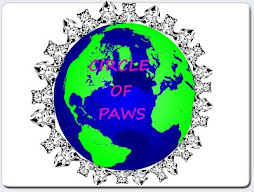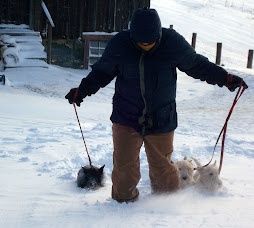skip to main |
skip to sidebar
As you all know, Cushings is a prevalent disease among Scottish Terriers. Although none of us have ever been diagnosed with it, we are aware that it can happen at any time. It is a manageable disease and once diagnosed a dog can live a happy and full life with a few minor adjustments.
Virginia-Maryland College of Veterinary Medicine invited all Scottish Terriers in the area to participate in the study. Below you will find an update.
Dear Scottie supporters,
Thank you to those veterinarians and owners who participated in the Virginia-Maryland College of Veterinary Medicine’s study of Atypical Cushing’s in Scottish terriers. We wanted to provide an update on our research findings for those who may be interested in learning more.
Atypical Cushing’s in Scotties
Cushing’s disease is a chronic debilitating disorder in dogs. Scotties have an unusually high incidence of Cushing’s. It can contribute to the development of diabetes, obesity, immune system problems, inappropriate urination, and other negative health outcomes. In normal dogs, the pituitary gland and adrenal glands produce hormones necessary for the function of many systems in the body. If something goes wrong in these glands and certain hormones are overproduced, then Cushing’s can develop. These abnormalities are often detected by observing clinical signs and when routine blood work shows elevations in a liver protein called ALP.
Our Earlier Findings
Preliminary data indicate that in Scottish Terriers, the cause of atypical Cushing’s appears to be due to excessive amounts of noncortisol steroids, which is an atypical form of the disease. These findings prompted the group at the vet school here to speculate that there might be a unique underlying cause for atypical Cushing’s in this breed. The study you participated in was designed to test those theories.
Our preliminary research, which has been ongoing for several years, had already figured out a few things:
· In the most common form of Cushing’s, excessive amounts of a single hormone from the pituitary gland signals the adrenal gland to overproduce cortisol. However, in Scotties excessive amounts of sex hormones, not cortisol, are observed.
· This increased production of adrenal sex hormones is not due to excessive amounts of a variety of pituitary signaling hormones.
· These elevated concentrations of sex hormones are the cause for the increased ALP values commonly seen in these dogs.
· There is no indication of adrenal cancer as a cause for this increased production of sex hormones.
· The magnitude of ALP elevations increases over time, but pituitary and adrenal regulation do not change.
The Virginia-Maryland college team identified 3 candidate genes in a very small pool of patients which are uniquely expressed in Scotties with atypical disease compared to normal Scotties and other breeds with Cushing’s disease, and undertook the study you participated in to understand how these genes might influence the development of atypical Cushing’s.
The Newest Study
The latest study you participated in found that there was indeed a genomic variation in Scottish terriers that was associated with increased serum ALP activity. The variation was located on the same chromosome as a gene responsible for inactivation of sex steroids. Genes can be active (expressed) or inactive (not expressed). If genes are overexpressed, their effect can increase. If they are under expressed, their effect is reduced. In Scotties, the sex steroid inactivation gene was under expressed in comparison to other breeds with Cushing’s disease (pituitary dependent hyperadrenocorticism). We suggest the gene variation seen in Scotties may be linked with “turning off” this sex steroid inactivation gene, leading to increased concentrations of sex steroids. We believe the higher concentrations of these sex steroids may explain commonly observed liver and ALP changes seen in Scottish terriers.
Questions?
The results will be published in academic journals, shared with the AKC’s Canine Health Foundation, and published on the AVMA’s clinical research website. We hope that better understanding of the mechanisms of this disease in Scotties can lead to better treatments for affected dogs.
If you have any questions about this research, please don’t hesitate to get in touch.
Mindy Quigley
Clinical Trials Coordinator
Veterinary Clinical Research Office
Virginia Tech
Virginia-Maryland College of Veterinary Medicine
205 Duck Pond Drive
Blacksburg, VA 24061
Office Phone: 540-231-1363
Web: http://www.vetmed.vt.edu/clinical-trials/
Working Hours: T, W, TH (8:30am-5pm)



























2 comments:
Cushing's is something my Lee knows all about. Her Half Pence had Cushings and was on the drug Lysodren for over six years. His came from a node on his pituitary gland not from his adrenal glands above his kidneys. Scan showed that. There have been many studies done on this darn disease. Lee was always having his liver tested and his blood levels.
Thanks for the info
Sweet William The Scot
That's very interesting. Our little Lucy had Cushings as did Miss Morgan. They lived nice long lives with it. Our Samba had it due to the high levels of prednisone that she needed for her Myositis.
Post a Comment